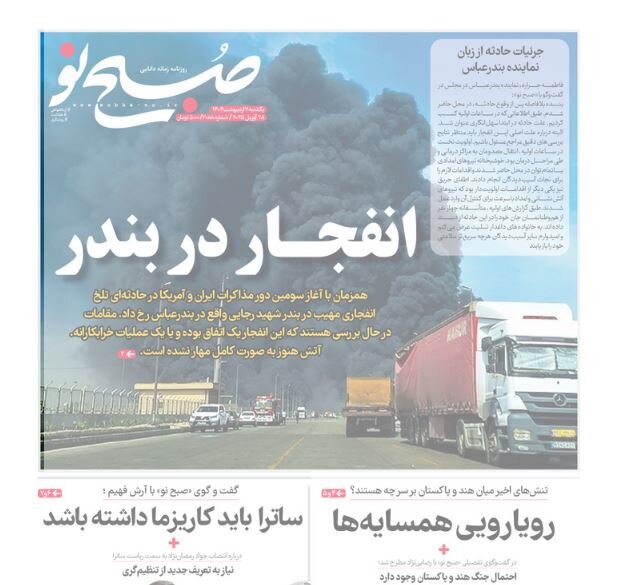Zionist regime's position on indirect talks between Iran and US

TEHRAN - In an analysis, Sobh-e-No addressed the Zionist regime's position on the Iran-U.S. talks and wrote: At the same time as the new round of indirect talks between Iran and the U.S. has begun, the Zionist regime has once again adopted its confrontational and provocative approach towards Tehran's active diplomacy.
The recent positions of the regime's political and security officials indicate Tel Aviv's growing concern about the revival of any agreement between Tehran and Washington. Since the start of the indirect talks in Muscat, the Zionist regime's officials have openly tried to disrupt or make the talks ineffective by creating a media atmosphere, launched intensive contacts with Washington, and put pressure on European allies. The Zionist regime has traditionally opposed any reduction in tension between Iran and the West, as it considers the continuation of tensions to be part of its security strategy. In the current situation, the regime's efforts are focused on disrupting the diplomatic path and magnifying the threat from Iran. However, the success of Iranian diplomacy and the cohesion of the resistance front in the region can defeat this destructive scenario.
Farhikhtegan: Rubio’s psychological warfare on the eve of technical talks
In a note, Farhikhtegan discussed the statement of Marco Rubio, the U.S. Secretary of State. Rubio said: “If Iran wants a peaceful nuclear program, it can buy and import enriched uranium from abroad instead of enrichment.” Although he does not explicitly talk about shutting down Iran’s nuclear program, his reference to the need to stop enrichment and import nuclear fuel is no different from the idea of shutting down Iran’s nuclear program. His statements on the eve of entering the third round of negotiations were mostly aimed at manipulating public opinion in Iranian society and shifting the focus of the dispute to the need for enrichment or its import. His speech has the potential to create a new controversy in the country’s political atmosphere. It seems that the U.S. seeks an Emirati plan for Iran. The United Arab Emirates has nuclear power plants, but it imports enriched uranium for its nuclear power plants and has no nuclear enrichment program. Pursuing this idea and or accepting this condition will ultimately undermine Iran's nuclear activity.
Jam-e-Jam: Why nuclear talks are welcomed by regional countries
The American propaganda campaign against Iran that there will be a war against if it does not negotiate over its nuclear program greatly caused international and regional concern. Therefore, with the start of the negotiations, the countries of the region, especially the Persian Gulf states, welcomed them because these negotiations could prevent the outbreak of a war. The reason for this is that these countries thought that the negotiations could bring peace to the region. It seems that this time the negotiating atmosphere is more favorable than the JCPOA talks. There is more empathy in this regard, and everyone has acknowledged that the JCPOA format failed due to the West’s refusal to fulfill its commitments. Therefore, the new format is expected to lead to a successful end. The success of this process depends on the negotiation being pursued with better prospects and the other party fulfilling its obligations. Now, the atmosphere of the talks is favorable, and it is hoped that an agreement will eventually be reached to the benefit of the people’s economic well-being in the Islamic Republic. At the same time, one should not take only one path to resolve the country's issues. Different paths should be active, including the current process of negotiations that is being pursued.
Siasat-e-Rooz: Interactions that must be seen
Siasat-e-Rooz devoted its editorial to the meeting between Iranian and Russian officials in Moscow before the start of the third round of negotiations. The paper said: One day before the start of the third round of negotiations, a very important economic move step was taken which can be referred to as a practical measure to neutralize the sanctions. According to published reports, the outcome of this meeting was agreements such as expanding trade between the two countries, increasing technical and scientific cooperation, building a new nuclear power plant in Iran, and transporting Russian gas overland to Iran. Iran and Russia have always emphasized that they will not give in to pressure and will strive to meet each other's needs through internal, bilateral, and regional capacity building, and adopt a unified approach against the sanctions. The aforementioned meeting was the practical dimension of this unified approach, which certainly has many implications for global multilateralism and confronting the destructive unilateralism of the West. The founders of the new world order and confronting American unilateralism, such as Iran, China, and Russia, have the necessary will to develop comprehensive relations and confront the sabotage and excesses of the hegemonic system, and they can form a new structure of the international system through interaction and convergence while securing common interests.
